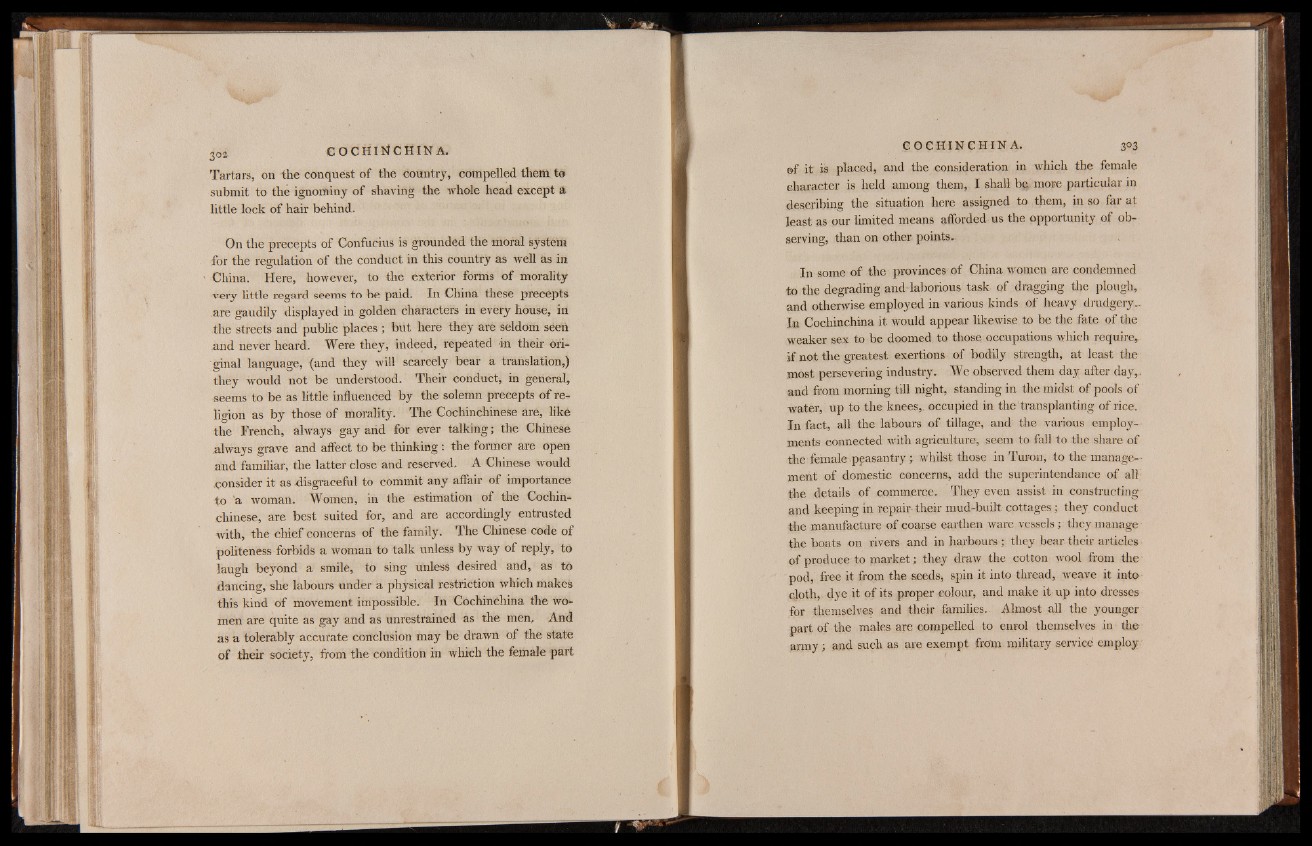
Tartars, on the conquest of the country, compelled them to
submit to thé ignominy of shaving the whole head except a
little lock of hair behind.
On the precepts of Confucius is grounded the moral system
for the regulation of the conduct in this country as well as in
China. Here, however, to the exterior forms of morality
very little regard seems to be paid. In China these precepts
are gaudily displayed in golden characters in every house, in
the streets and public places ; but here they are seldom séeri
and never heard. Were they, indeed, repeated -in their original
language, (and they will scarcely bear a translation,)
they would not be understood. Their conduct, in general,
seems to be as little influenced by the solemn precepts of religion
as by those of morality. The Cochinchinese are, like
the French, always gay arid for ever talking ; the Chinese
always grave and affect to be thinking ; the former are open
and familiar, the latter close and reserved. A Chinese would
consider it as disgraceful to commit any affair of importance
to 'a woman. Women, in the estimation of the Cochinchinese,
are best suited for, and are accordingly entrusted
with, the chief concerns of the family. The Chinese code of
politeness forbids a woman to talk unless by way of reply, to
laugh beyond a smile, to sing unless desired and, as to
dancing, she labours under a physical restriction which makes
this kind of movement impossible. In Cochinchina the women
are quite as gay and as unrestrained as the men. And
as a tolerably accurate conclusion may be drawn of the state
of their society, from the condition in which the female part
©f it is placed, and the consideration in which the female
character is held among them, I shall be, more particular in
describing the situation here assigned to them, in so far at
least as our limited means afforded us the opportunity of observing,
than on other points.
In some of the provinces of China women are condemned
to the degrading and laborious task of dragging the plough,
and otherwise employed in various kinds of heavy drudgery...
In Cochinchina it would appear likewise to be the fate of the
weaker sex to be doomed to those, occupations which require,
if not die greatest exertions of bodily strength, at least the
most persevering industry. We observed them day after day,,
and from morning till night, standing in the midst of pools of
water, up to the knees,, occupied in the transplanting of rice.
In fact, all the labours of tillage, and the various employments
connected with agriculture, seem to fall to the share of
the female peasantry ; whilst those in Turon, to the management
of domestic concerns, add the superintendance of alb
the details of commerce. They even assist in constructing
and keeping in repair their mud-built cottages ; they conduct
the manufacture of coarse earthen ware vessels ; they manage
the boats on rivers and in harbours-; they bear, their articles
of produce to market ; they draw the cotton wool from the
pod, free it from the seeds, spin it into thread, weave it into
cjoth, dye it of its proper colour, and make it up into dresses
for themselves and their families... Almost all the younger
part of the males are compelled to enrol themselves in the
army ; and such as are exempt from military service employ